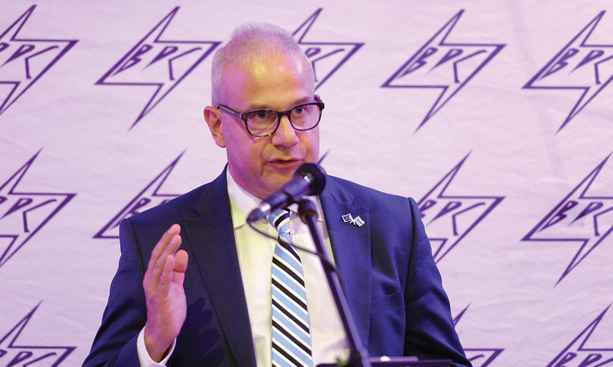The CEO of Botswana Power Corporation (BPC), Dr. Stefan Peter Schwarzfischer, says the implementation of their MASA 2020 strategy has gone well so far.
MASA 2020 is a five-year programme divided into two years of restructuring, and three years of process re-engineering and customer service improvement.
“The main objectives of this restructuring strategy are to regain BPC’s financial stability to reduce Government subsidy to zero within 5 years, to provide secure power to BPC’s customers and to connect more people to the electricity grid. BPC has successfully completed the two year restructuring and retrenchment exercise,” he said in a statement.
Below is the full statement from BPC:
The Corporation received for the first time in fifteen (15) years, a non-going concern certificate by its auditors PWC Botswana. The accumulated profit of the Corporation increased by P 2.010 billion, and at the same time Government tariff subsidy was reduced from P 1.667 billion to P 800 million, making a reduction of P 867 million. This is a clear indication that BPC is achieving its financial independence objective as per the MASA 2020 Transformation Strategy. Furthermore, the Earnings before Interest, Taxes, Depreciation and Amortization (EBITDA) increased from minus 33 per cent to plus 16 per cent.
The Gearing Ratio, which compares the company’s equity to the company’s fund borrowed, improved from 95 per cent to 51 per cent slightly outside the global standard of between 25 per cent and 50 per cent. The current liquidity ratio that measures a company’s ability to pay short-term and long-term obligations improved from 31 per cent to 59 per cent. From all these financial gains, P 250 million emanated from the latest tariff increase whereas most of the improvements were as a result of internal factors such as:
· The Corporation has increased the Morupule B Power Station (MBPS) maintenance staff, and in parallel up-skilled and trained its operational staff to increase availability from 67 per cent in September 2016 to 74 per cent in January 2019. This significant change led to import reduction of power to P 880 million, which reduced the required consumption of imported power from 55 percent down to 12 percent.
· While the production cost for MBPS stayed quite stable over the years with approximately 50 Thebe/kWh the average costs per electricity unit also went down from 131.12 Thebe/kWh to 108.03 kWh, which is a cost reduction of 17.6 percent.
· BPC increasing its sale to the non-mining sector from 2482 GWh to 2534 GWh, which is an increase of only 2 per cent. In the same period consumption of the mining sector declined from 828 GWh to 679 GWh (-18 per cent).
As it is the BPC’s strategic pillar to connect the whole country to the grid, in the recent months the Corporation connected 13 per cent more customers to the grid, hence increasing its customer base to 463 000. In 2017/18, BPC connected 24 new villages to its distribution network and extended it in 69 villages. BPC is also proud to announce that access to electricity has increased from 69 per cent in 2016 to 81 per cent in 2019. BPC completed its retrenchment and reorganisational exercise in which approximately 530 people left the Organisation on a voluntary basis. These changes were driven by the Corporation’s objective to outsource services to the private sector to increase efficiency, particularly roles that were not core business such as cleaners, security guards and vehicle fleet maintenance.
Powering Botswana Towards Prosperity
On staff rationalisation, the Corporation took a profound decision to invest in areas which were lacking through training of staff and capacity building. To date, the Corporation has got 140 more employees than at the beginning of the restructuring exercise.
As staff at MBPS were undergoing a long term training programme by STEAG, the Operations & Maintenance contractor, the Corporation was able to ramp down the initial 400 operational staff members of STEAG to twenty-two (22) as at 22nd January 2019. The STEAG staff compliment has been replaced by locals. It is worth noting that the recruitment to fill in vacancies was carried out with due diligence tapping on both the internal and external market to find the right human capital to drive its goal of becoming a world class organisation.
